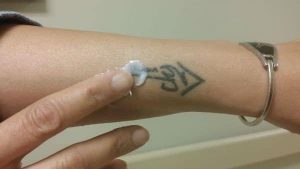Do Tattoo Removal Creams Actually Work?
We are slowly emerging from the double haze of 2020 and New Year’s Eve, even though the latter may have been slightly less of an exuberant party occasion than normally. However, it is still a new year and with that comes the inevitable desire to reinvent oneself. A sense of having wiped the slate clean, a chance to start over. Which could explain why many believe that cover-up tattoos will be one of the biggest trends for the coming 12 months.
Sometimes, to make a cover-up as successful as possible, your artist could recommend you laser the area a few times to break up the pigments and make it easier to tattoo over. While lasering has come a long way over the past few years, it is still a process which is not entirely without discomfort – or cost, for that matter.
An alternative for getting rid of that regretted ink has been marketed for some time – so-called tattoo removal creams. But what are they and do they really work? The short answer is – no. But let’s take a closer look at this phenomenon and what kinds of claims their manufacturers are actually making.

Lofty claims drawing on dangerous skin brightening practices
As the name would imply, tattoo removal creams are supposed to be applied to skin in hopes of erasing or at least fading the tattoo. They claim to remove ink by bleaching or peeling away part of the skin. Some even say they can replace the white blood cells filled with ink that make a tattoo permanent.
Skin bleaching creams have been on the market for a long time, profiting from demand in regions were a fairer shade of skin had been deemed aesthetically more pleasing or desirable. In India, it is a multi-billion dollar industry with the first product launched in 1975. While this is a morally questionable industry for many reasons, recent reports also suggest that using these kinds of products could be incredibly detrimental to long-term health.
Beyond the active ingredients in such creams, hydroquinone, being described as the biological equivalent of paint-thinner, they can cause immediate allergic reactions, skin peeling, acid burns and even permanent scarring.

Painful and potentially dangerous to health
Tattoo removal creams most often contain something similar called trichloroacetic acid. This is used for dermatological treatments by professional skincare specialists all the time. However, it can be very dangerous to use at home without training.
Even websites listing “the top so-and-so many tattoo removal creams to buy” add to the cons of the creams which have any efficiency that they are “painful” and “potentially dangerous to health.” Two things should never be sacrificed to save a few quids – health, and good quality tattoos.
So while tattoo “removal creams” may seem like a tempting option when weighing cost and time, our clear suggestion is to stay away from them. Should you require lightening up of some ink before having one of our artists provide you with a new piece that you will not regret, have it lasered by a trained, reputable professional, such as the ones associated with Vivid Ink. Ask your studio for more information.
